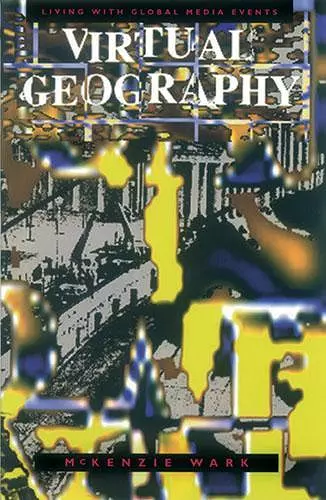Virtual Geography
Living with Global Media Events
Format:Paperback
Publisher:Indiana University Press
Published:22nd Nov '94
Should be back in stock very soon

Cultural studies at the intersections of global media and everyday life: the Gulf War, the Beijing massacre, the fall of the Berlin Wall, the stock market crash of 1987.
"The author's capacity to grasp and interpret these [world media] events is astounding, and her ability to provide insights into a world where unbounded information is circling the earth with the speed of light is startling." —Choice
" . . . a wide-ranging, quirky and dextrous mix of description, theory and analysis, that documents the perils of the global telecommunications network . . . " —Times Literary Supplement
" . . . this is a stimulating, even moving, book, dense with ideas and with many quotable lines." —The New Statesman
"Wark is one of the most original and interesting cultural critics writing today." —Lawrence Grossberg
McKenzie Wark writes about the experience of everyday life under the impact of increasingly global media vectors. We no longer have roots, we have aerials. We no longer have origins, we have terminals.
"Wark describes and critiques the global media information flow that made the Persian Gulf War, the fall of the Berlin Wall, the Tiananmen Square massacre, and the Black Monday stock market crash of 1987 part of everyday experience. She calls this phenomenon telethesia. This is a new geography: we are everywhere in the world at once, a place constructed entirely by the convergence of mediated flows of information—virtual geography. She does not condemn this third reality, but instead establishes the grounds for a new form of cultural studies that follows the contours of the media event and does not force the event into existing disciplines. The author's capacity to grasp and interpret these events is astounding, and her ability to provide insights into a world where unbounded information is circling the earth with the speed of light is startling. Her language at first seems forced and contrived as she pours out abstract and speculative explanations of vectors, nature, telethesia, etc. However, in the end she comes close to making the linearity of print project a world of global electronic information in which traditional modes of rationality are inadequate to explain what happens when information passes out of the orbit of one community into another. She demonstrates that the unstoppable rush of electronic information not only makes everything in the world knowable, but also carries with it the possibility of disinformation and discontrol. Recommended for upper—division undergraduate, graduate, and research collections."—R. Cathcart, Queens College, CUNY , Choice, May 1995
ISBN: 9780253208941
Dimensions: unknown
Weight: 386g
272 pages